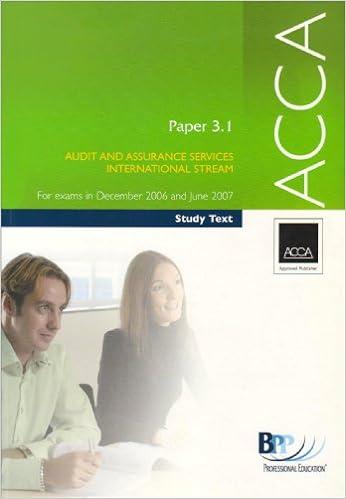Question
The Audit Firm The audit firm of Stark Lannister LLP, Chartered Professional Accountants, has been the audit firm for ColAlta Pipeline for the past four
The Audit Firm
The audit firm of Stark Lannister LLP, Chartered Professional Accountants, has been the audit firm for ColAlta Pipeline for the past four years. The working relationship between Stark Lannister and ColAlta has been very positive to date; no major accounting issues have come to light in previous audits, and an unmodified audit opinion has been issued every year. Stark Lannister is a mid-size accounting firm headquartered in Calgary. The firm employs 83 people, ranging from clerical support staff through junior accountants to supervisors and senior managers. The firm currently has 18 partners.
It is the practice of Stark Lannister to rotate audit partners every three years to maintain independence and objectivity during the audit process. Melissa Stuart, CPA, CA is the audit manager assigned to this years audit of ColAltas financial statements. Although Stark Lannister has been the auditor for ColAlta for several years, this will be Melissas first year as the audit manager for this client. You and your teammates are junior accountants in the firm, and you have been assigned to conduct the audit.
Transcripts of Interviews with ColAlta Personnel
Accounts Receivable / Billings Clerk Aminah Ahmed
Auditor: Thank you for taking the time to speak with me.
Ahmed: Youre welcome.
Auditor: Just for the record, can I get your name and position?
Ahmed: My name is Aminah Ahmed, Im one of the Accounts Receivable / Billings Clerk for ColAlta Pipelines.
Auditor: Are you the only person who can create invoices to charge the customers?
Ahmed: No, theres two of us: myself and Dawn Perry. We both have the same access to the computer system to create invoices. We both follow the same process.
Auditor: As I understand, your role is to generate invoices to ColAltas customers for the natural gas that the pipeline transports.
Ahmed: Thats correct. Each day, I receive delivery receipts, and I enter those into the computer system to create the invoices.
Auditor: Where do the delivery receipts come from?
Ahmed: Theyre filled out at each collection point as the gas is delivered into the pipeline. Each collection point sends a pdf copy of their receipts each day to the Contracts Manager. She sorts them between contract customers and non-contract customers. She sends the ones for the contract customers directly to me. The one-off customers go to the Finance Manager first, and then to me after credit terms have been arranged.
Auditor: What do you do with the delivery receipts once you get them?
Ahmed: I use the information on the receipts to create an invoice. Invoice numbers are automatically generated by the computer. Each customer has a unique customer number. I input the customer number, contract number, and date and volume received.
Auditor: How many invoices do you usually create each day?
Ahmed: It depends on the volume of deliveries to the various connection points. On a slow day, I might create a half dozen invoices; on a busy day, there might be a couple dozen.
Auditor: How does the price get assigned to each invoice?
Ahmed: The prices are all stored in the computer system. I dont have access to the price files. The pricing table is set up for contract or one-off customers, and the price depends on which connection point initiated the process. When I enter the information from the delivery receipt, the system automatically assigns the right price for the customer and location.
Auditor: Who sets up the prices on the system?
Ahmed: The Contracts Manager maintains the pricing table based on the contracts negotiated with the customers.
Auditor: Once everything is entered, how do the invoices get sent out to the customers?
Ahmed: Every day at 4:00, we run a program on the system that prints out all the invoices for the day. Some of our customers want physical copies of the invoices, some prefer having electronic copies of the invoices e-mailed to them. I sort through all the printed invoices, and split out the ones that want electronic copies. I scan those to a pdf and e-mail them to the appropriate customers. The rest I give to the Receptionist; she makes sure the invoices go in the mail the following morning.
Auditor: Do you keep a copy of the invoices on file?
Ahmed: Not a paper copy, no. Once the invoice is created, we can look it up on the system at any point in time. The file is write-protected, so that the invoices cant be edited or changed once theyre posted to the system.
Auditor: What about payment do the customers pay the invoices on time?
Ahmed: That, I cant help you with. Im not involved with recording the receipt of payment at all. Something about segregation of duties.
Auditor: I think that gives me what I need to know about invoicing. If I think of any other questions, can I come back to see you?
Ahmed: No problem, happy to help.
Question
1- Identification of significant financial statement risks
| Description of Potential Financial Statement Risk (full description do not name the type of risk | Financial Statement Account(s) Affected if applicable or Pervasive in nature | Financial Statement Assertion(s) if applicable or Overall (overall only applicable if the risk is pervasive) | Explanation of why a risk/ Justification |
| Risk1 : | |||
| Risk 2: | |||
| Risk 3: | |||
| Risk 4: |
Step by Step Solution
There are 3 Steps involved in it
Step: 1

Get Instant Access to Expert-Tailored Solutions
See step-by-step solutions with expert insights and AI powered tools for academic success
Step: 2

Step: 3

Ace Your Homework with AI
Get the answers you need in no time with our AI-driven, step-by-step assistance
Get Started


